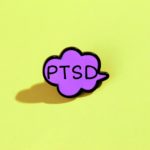Table of Contents
Post-traumatic stress disorder or PTSD can be experienced by anyone that has gone through a highly stressful dangerous situation, sexual or physical assault, accident, or natural disaster. Military personnel are among the highest number of people suffering from PTSD due to their active role in war and combat. Their experience with suffering, death, and violence leaves their brain reeling and they develop PTSD as they fail to cope with the aftershocks of the trauma.
It is a normal reaction of our brain to get a little haywire after going through immense stress or trauma. But the inability of the brain to recover and persistent recalls of the trauma might turn into a mental ailment known as PTSD. The mind is stuck in the traumatic situation and the affected person might get flashbacks and nightmares of that trauma. These might be so vivid that the person might think they are reliving the whole traumatic episode. It all gets so bad and so overwhelming that the person cannot go through their usual day-to-day activities as basic as sleeping, socializing, and eating.
What is cognitive behavioral therapy and how can it help?
Cognitive Behavioral Therapy is a psychological exercise that focuses on the relationship between feelings thoughts and behavior. It observes and uses the different changes brought in these domains by interacting with others. Different theories are used to help PTSD patients recover from their traumas:
Emotional processing theory: This theory works by changing the unhealthy association of seemingly normal things with traumatic triggers. This results in diminishing the negative reactions bought on by these triggers and shows the patient that they are now in a safe environment and their surroundings have no association with the traumatic event they faced.
Social cognitive theory: This theory suggests that people often incorporate their trauma with their existing beliefs, which leads to the negative outlook they have on life and themselves. They correlate the negativity to them being bad and hence form the feeling of shame and guilt which feeds their suicidal intentions.
Therapists use these theories to treat patients. They make their patients realize and re-evaluate the negative patterns of their thought processes. This is done by different therapeutic methods like:
- Prolonged exposure therapy is in which the patient is exposed to their trauma and is guided through it and taught to control his reactions and emotions. This way, towards the end, the patient can recall and even talk about the traumatic events without getting triggered and going through anxiety-ridden, exaggerated responses.
- Cognitive processing therapy encourages the patient to talk about their trauma and understand their reaction and associated negativity to it, the patient is made to realize his feelings and fear and then allowed to discuss the ratin=onality of hid reactions. Patients, through discussion and sharing, overcome the trauma as well as find out ways in which they can get better.
In the end, it is important to know that psychotherapy is an individual experience, and people going through it react to it differently in different periods. The affected veteran as well as the people around them need to be patient and supportive. The brain and body must be given the space and time to adjust to the new reality. It depends on the person going through the trauma that how long they want to take to heal. Some veterans feel better after a few sessions and some might continue the therapy for a long time.
What are the symptoms of PTSD?
PTSD symptoms vary in nature and severity in each veteran. Commonly these symptoms are divided into four main types:
- Avoidance of triggers that remind you of the trauma: veterans that suffer from PTSD often all themselves off and isolate themselves from the rest of the world due to the fear of triggering disturbing memories. To avoid things, instances, or surroundings that may bring back flashbacks tend to withdraw from everything and everyone including their families
- A persistent reminder of the traumatic event: veterans are often reported to complain of intrusive, recurrent flashbacks or nightmares that are extremely vivid and painful. These reminders affect them extremely both in emotional and physical capacity.
- Being emotionally reactive and on edge: these people are always on edge and jumpy to situations that might remind them of their trauma. They show an exaggerated emotional response to normal events. They are found to be angry, irritable, and highly reactive.
- Negativity in general behavior: feeling of guilt, shame and fear engulf these people. They have a negative outlook on life and themselves. They suffer from survivor’s guilt and may lean towards suicidal thoughts and think that everything is their fault.
How can veterans who suffer from PTSD recover?
Veterans with PTSD can make conscious efforts at changing their lifestyle and outlook. The few things that might help them manage if not overcome these symptoms are:
- Exercise
- Self-regulation of your mind and body and their reaction to triggers.
- Improve social life: reconnect with people around you.
- Seek professional treatment: professional treatment involves seeking help from a doctor both psychologically and medically. You need to go to therapy as well as take the medication prescribed by your doctor regularly. The psychological treatment involves cognitive behavioral therapy, eye movement desensitization and reprocessing (EMDR) and medication like anti-depressants and anti-anxiety pills are very helpful.











